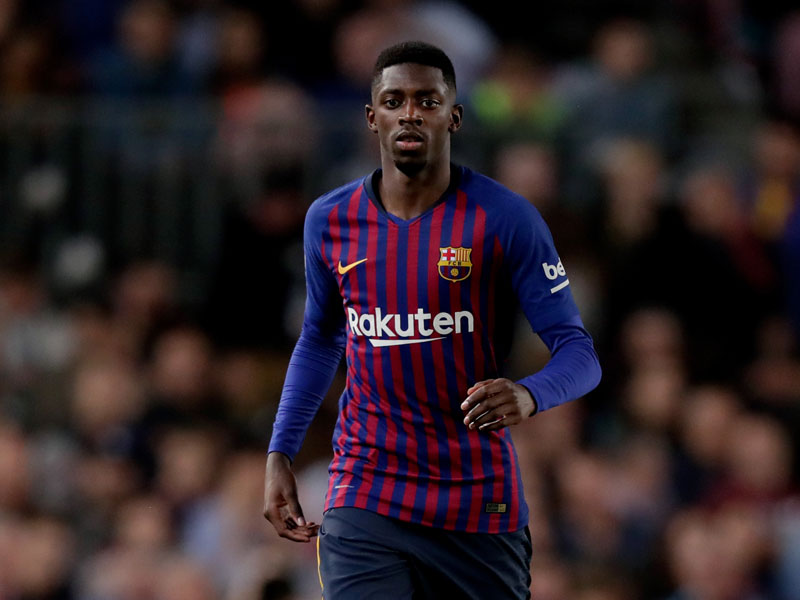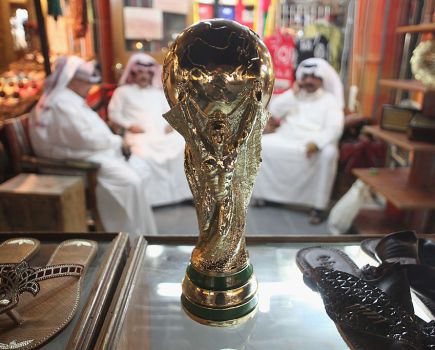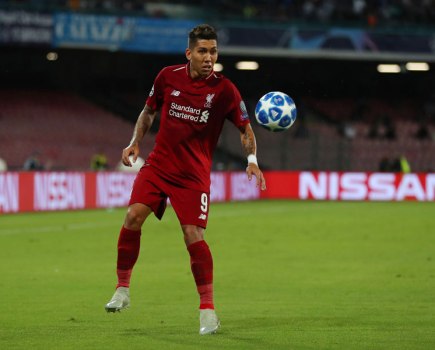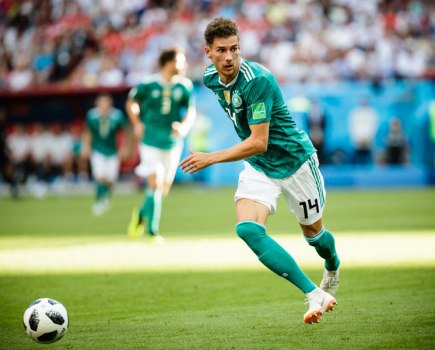Player Profile: Ousmane Dembele
Welcome to our page dedicated to the young star Ousmane Dembele. Below is an article that features in our November 2018 issue and tracks the rise of Barcelona‘s young forward. Give it a read below.
Player Profile: Ousmane Dembele – Breakout Star
A conurbation in Normandy of just 50,000 inhabitants, Evreux has emerged in the past couple of decades as one of the most fertile areas for footballing talent in France. Former France full-back Bernard Mendy, ex-Lille, Paris Saint-Germain and Lyon midfielder Mathieu Bodmer and current Marseille and Les Bleus keeper Steve Mandanda
all come from the town. As does potentially the best of the lot: 21-year-old Ousmane Dembele, who cost €105million when he joined Barcelona from Borussia Dortmund last year.
A member of France’s World Cup-winning squad this summer, Dembele now calls Camp Nou and Stade de France home. But as an adolescent he had to make do with
a rectangle of tarmac among the housing blocks of the down-at-heel Madeleine quarter of Evreux.
Known as the “Play” – anglicised no doubt for greater coolness – this was the place where he began his footballing apprenticeship. The narrative is common: the smallest kid with the celestial ability.
“You could say all us kids did our bit in helping ‘Ous’ develop his skills,” declares Dembele’s cousin, Amadou Diatta. “At the ‘Play’ we’d usually start one of those rondo games and he never seemed to end up as the piggy in the middle.
“Then we’d go and practise our crossing and shooting. Right foot and left foot. He was knee-high to a grasshopper but was already nutmegging opponents.
“It was obvious he wasn’t like the others, that he was better than everybody else. That was his destiny.”
From the age of six he was playing organised football, too. Ahmed Wahbi, a coach at local club ALM Evreux – later to become Evreux FC following a merger – spotted the youngster turning on the style on a patch of wasteland and, after a successful sales pitch to Dembele’s mother Fatimata, he got him on board.
It was paradise gained for a football-crazy kid like Ousmane, with a place at one of Normandy’s best, most structured amateur clubs, boasting some 600 players in all categories and two or three training sessions a week, plus a game on a Sunday.

Dembele playing for Rennes (Getty Images)
It was a copious diet of football by anyone’s standards but not enough for the young Dembele, who when training finished at the Stade du 14 Juillet would immediately join his friends for an extended kickabout. He could not get enough of the game – and too bad if it meant incurring his mother’s wrath for returning home late and not concentrating on his homework.
“He was so passionate about football,” says under-14 coach Romaric Bultel. “He went to school with a ball, he ran errands with a ball, he went to the store with a ball. It was his comfort blanket.”
Wahbi remembers the youngster for his diligence and discipline, recalling: “In all his time with us I don’t think he missed a single game or training session and was never late. Rain or shine, he was there. He never stopped making progress. He listened to advice. He was a worker.
“The only thing which frightened him was being forbidden to play football. One day his primary school headmistress rang me to say he’d been naughty. She knew football was the only way to get through to him and asked me to intervene.
“I threatened not to pick him for our next game. I warned him that he would have to leave the club if he continued to behave badly. He cried, he looked disconsolate. He apologised and was never in trouble again.”
In terms of his basic playing style not much has changed since those days at the Evreux academy. Back then, as now, he was a vibrant, instinctive attacker with incredible close control and comfortable using either foot. No one in the Evreux youth system worked harder than him in “weaker-foot only” drills.
“When I first saw him in action I was amazed to see him take corners from both sides of the pitch with his left or right foot,” says Evreux schoolboy coach Gregory Badoche. “I asked him about it and he nonchalantly replied that it didn’t bother him either way. It was a response which stuck with me.”
Coaches at the Evreux academy did not need a UEFA A licence to realise they had a gem in their midst. In young Ousmane they had a guaranteed game-breaker who was dribbling and goalscoring machine. The sort of mini-genius who had no problem competing in higher age categories. His best display in those formative years was probably for the under-12s in a 7-0 hammering of Corsican outfit Bastia.
On occasion his talent could irritate the Evreux guardians. With Ousmane capable of deciding a match on his own, team-mates found it easy to shirk responsibility, happy just give him the ball and let him work his magic. “When he was in my under-13 side I tried to work on his mental approach, to encourage him to mature, to be more collectively aware,” recalls Badoche. “Initially, he didn’t take it well. In one game I had to substitute him early for going on a long dribble. He came to understand, though.”
On hitting his teens, the only career path Dembele had in mind was that of a professional footballer. Aware of the good he could do as his family’s main breadwinner he strove even harder to make the grade.
In the early days times were tough indeed for the Dembele fraternity. The Madeleine district was an unemployment hot spot and for his mother – a lone parent of Mauritanian and Senegalese descent – life was a relentless struggle to feed and clothe Ousmane, his brother and two sisters.
“While walking to training at Evreux, ‘Ous’ was always talking of being a full-time footballer,” recalls his cousin Moustapha Diatta. “His big hope was to earn enough to take the family out of our quarter.”
At 13 his dream began to take form as glowing reports of the speedster with the velvety touch stirred the interest of PSG, Lens, Nimes, Caen, Valenciennes and Le Havre.
“Dembouz”, however, finally opted to join the youth system at Breton outfit Rennes, an alliance which was part fate, part recruiter persistence.
“I first saw Ousmane when he was eight or nine,” recalled Rennes scout Armand Djire in an interview with L’Echo Republicain newspaper. “I’d gone to a match in Evreux to look at a young keeper. During a break in play I turned my head and saw a group of kids practising on an adjoining pitch.
“There was Ousmane. He really stood out with his skills. I found out his name and made a note of it. Two years later I went to check him out again for Rennes. He had something extra which the kids of his age didn’t possess. He already was inventing his own tricks.
“I’d regularly watch him play and got to know him and his family. We earned their trust and put together a special support plan for him at Rennes. We brought his family along with him and saw to it that their professional and personal needs were satisfied.” A flat and a job in other words.
If there is a theme that runs through Dembele’s sporting life it’s his willingness to rebel against perceived injustices, and as an 18-year-old Rennes reserve team player he came close to quitting the club in a huff. The cause of his frustration was zero first-team opportunities and the club’s tardiness in offering him a first pro contract.
Rumoured to be on the radar of Manchester City, Red Bull Salzburg and Benfica, Dembele was determined to severe his ties with the Bretons, and in the summer and autumn of 2015 a sustained stand-off ensued.
Without the work as peacemaker of then-Rennes presidential advisor Mickael Silvestre – who was formerly a defender with Manchester United, Arsenal and France – the deadlock might never have been solved.
“The affair dragged on for a long time and required a lot of diplomacy to sort out,” says Silvestre. “Ousmane had boycotted pre-season training and a preparation camp in Germany. However, he finally saw reason and decided that he would, after all, sign with us.
“It was a complicated business. When the transfer window closed that summer he sent us a text saying that he was disgusted with the situation and wanted to stop playing the game. He said he was going to Senegal with his grandmother and even showed us his boarding card.”

Dembele playing for France (Getty Images)
Dembele would adopt the same approach in the summer of 2017 in his attempts to force Dortmund to sell him to Barcelona. He went on strike for two weeks, incurring a club suspension, and was slammed up and down Germany for his unprincipled, mercenary attitude. Just a year earlier he had been delighted to sign a five-year deal with the Schwarz-Gelben; now he was setting up a one-man picket line.
His was a display of ingratitude personified screamed the critics. A lifelong Barca and Lionel Messi fan, Dembele simply could not understand Dortmund’s reluctance to let him go. His dream move was in the offing and to make it happen he was ready to go to any lengths.
“What else could I have done?” he quizzed an interviewer from French magazine Onze-Mondial. “I’d like to ask all those who’ve criticised me how they would have behaved if they were in my shoes. I was in contact with Barcelona while at Rennes. I couldn’t miss out on a transfer to Barcelona for a second time.”
Nothing, it seems, is ever plain sailing for Dembele.
A mere three weeks after joining Barcelona he was sidelined for over three months with a ruptured thigh muscle and since making his senior international debut for France in a January 2016 friendly against Italy he has yet to completely carve out a niche for himself with his national side. He started only two of their games in this summer’s triumphant World Cup campaign – the group phase ties versus Australia and Denmark, and was particularly disappointing against the Socceroos.
France boss Didier Deschamps continues to include the youngster in his squad and clearly appreciates his speed and deep threat. But he expects much, much more from the Barca winger.
“Ousmane has to be more consistent,” explained Deschamps at a recent federation press conference. “He has to engage with all the demands of football at the highest level. I don’t think he’s totally got to grips with that.
“However, he’s only young and very much has the attacking qualities to unblock situations. He’s had a good start to the season with Barca. He’s been decisive and scored goals.”
Some might argue that the root cause of Dembele’s under-par productivity with the national team is the Deschamps system itself. The latter is essentially a defensive-minded coach who is as risk-averse as it is possible to be. Ousmane is the exact opposite: insouciant, adventurous, the total free-spirit package.
Certainly Dortmund coach Thomas Tuchel did a wonderful job of bringing the best out of him in the 2016-17 campaign. Tuchel, now in charge of Paris Saint-Germain, is usually considered a cold, unsympathetic character, but he treated Dembele with almost paternalistic care. In many ways, the youngster was TT’s pet project, a canvas he just loved to paint on.

Tuchel and Dembele at Dortmund (Getty Images)
Tuchel did not merely ask the French youngster to hug the left or right touchlines, he often used him inside too, allowing him to flit back and forth between a number 10 role and the right flank. Inventive, elusive and brimming over with tempo and unpredictability, Dembele proved to be a Westfalenstadion sensation.
That season he ticked every box: the numbers (nine goals and 21 assists in all competitions); the big-game decisiveness – notably when inspiring his side to a 3-2 German Cup semi-final victory in Bayern Munich’s backyard; and the conquest of his first-ever professional title, the German Cup. Not bad for a player who only cost the Dortmunder €15m.
“Thomas was a coach who had a lot of faith in me,” gushed Dembele on Barca TV shortly after arriving at Camp Nou last year. “He was always there at my side and taught me so much. He wouldn’t hesitate to pull me up and point out where I was going wrong.”
Significantly, Tuchel was one of the few high-profile Germans to defend Dembele for his controversial departure to Barcelona and, given the pair’s close relationship, it would be no surprise at all if they were reunited in the Gallic capital in a not-too-distant future.
Dembele was also intelligently handled by Rennes in his first-team breakthrough season in 2015-16. Allowed to play his natural, electric game and not over-burdened by defensive instructions, the then 18-year-old fearlessly seized his chance. Devilishly difficult to stop when dribbling and ice-cool in his finishing, he got 12 goals in Ligue 1.
Like Tuchel, Rennes would deploy him in a variety of positions: left wing, right wing, second striker and attacking midfielder. Wherever he lined up he spelt menace, and in March 2016 he further enhanced his reputation with a brilliant hat-trick in a 4-1 thumping of Nantes, the first triple of his career. It was a one-two-three to suit every taste: a sweetly struck half-volley from the edge of the box, a spot of acrobatic ball-diversion in the red zone, then a composed finish following a solo raid and a destabilising drop of the shoulder.
“I think I’ve succeeded in finding his best role on the pitch,” said Rennes coach Rolland Courbis at the time.
“I like him as a nine-and-a-half behind the main striker. It’s similar to how Monaco have Mbappe playing off Falcao up front. The kid is a pleasure and a satisfaction. He goes out onto the field to enjoy himself.
“He plays in Ligue 1 as he would in the schoolyard.”
Never short of a memorable turn of phrase, it is those final words from Courbis which perhaps sums up the essence of “Dembouz”
Don’t forget to follow World Soccer on Facebook and Twitter.







